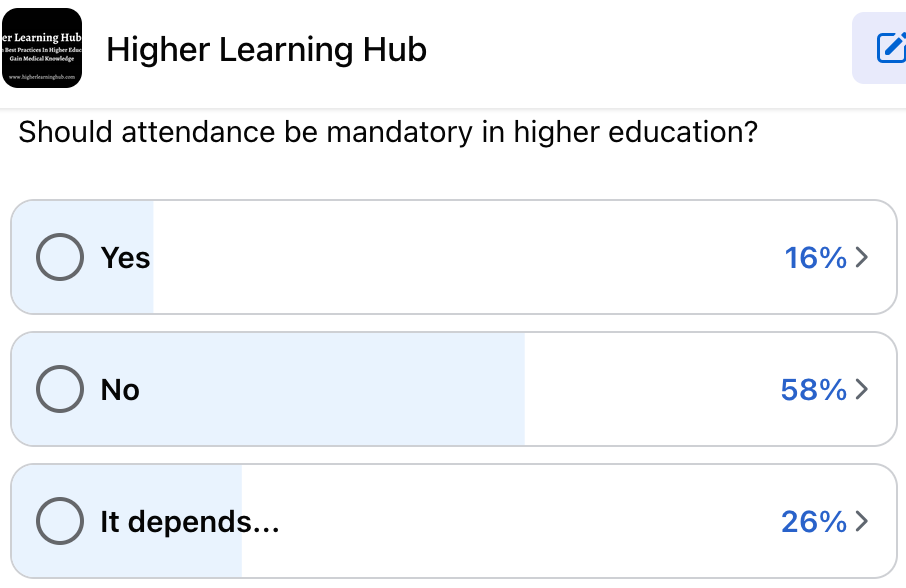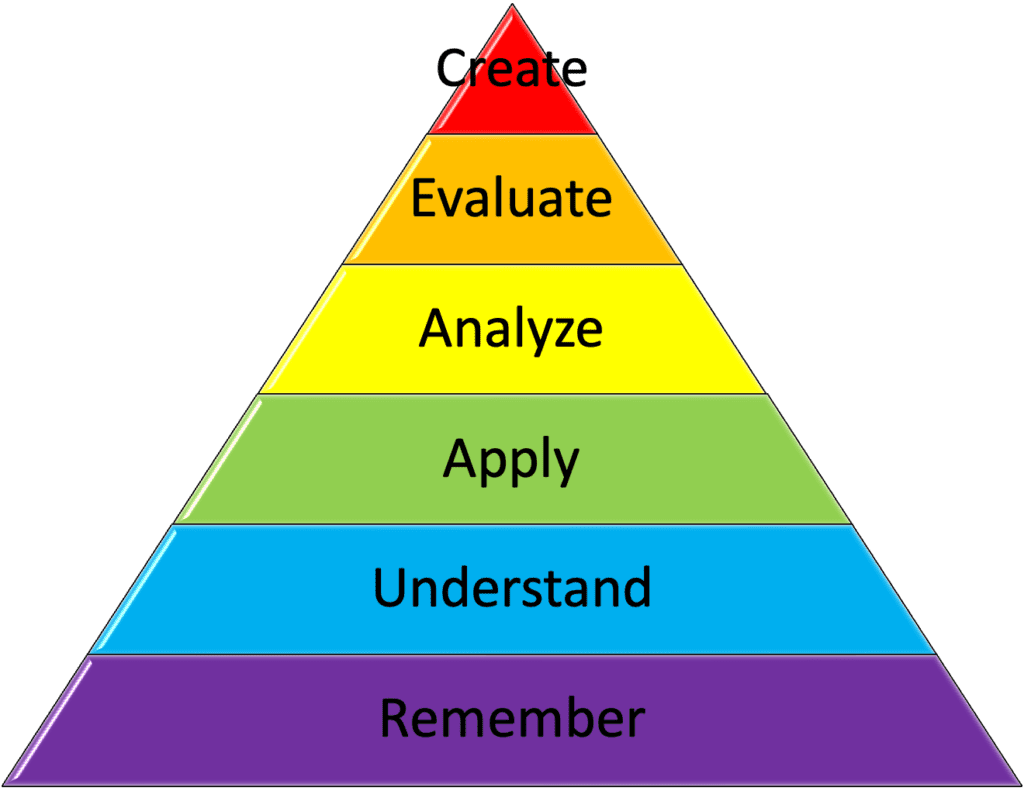Authored by Dr. Leland Jaffe; Associate Dean and Professor; Published on May 11th, 2024
Higher education is an exciting and challenging time marked by critical decisions, and one recurring dilemma for students is whether to attend classes or choose to miss class and study the content independently. Students can find academic success by attending class, but many others are successful in learning the material independently at home. In this blog post, we’ll unpack the benefits of attending classes in higher education, and discuss the potential benefits of skipping class.
The Benefits of Class Attendance in Higher Education:

Structured Learning Environment:
Regular class attendance provides students with a structured and organized learning environment. Professors carefully design their courses to unfold in a logical sequence, and student attendance ensures that they receive information in the intended order, facilitating better comprehension of the material.
Active Engagement:
Attending classes fosters active engagement with the material. In-class discussions, group activities, and real-time Q&A sessions allow students to actively participate in their learning, enhancing their understanding of complex concepts. If students are not present in class, they don’t have the opportunity to participate in formative assessments or other class activities to assess their knowledge of the material. Formative assessments benefit both the student and the teacher, and without knowledge of the students’ comprehension of the material, it can be difficult to assist students.
Immediate Clarification:
The classroom setting offers a unique opportunity for students to seek immediate clarification on doubts or questions. Professors can spend class time providing on-the-spot explanations, ensuring students don’t carry misconceptions or misunderstandings. Students have the opportunity to speak with the course instructor before or after class to clarify topics, which is not possible if class is missed.
Building Relationships:
Beyond the academic importance, attending classes allows students to build relationships with fellow students and professors. Networking within the educational community can lead to collaboration opportunities, study groups, and even mentorship with the faculty. The faculty member teaching the class will remember those who attend and are actively engaged throughout the class session. Further, I feel that classroom attendance helps students to develop their confidence in speaking up and interpersonal skills.
Classroom Resources:
Professors often share valuable resources during class, such as additional readings, practical tips, or insights that may not be available through course materials alone. Accessing these resources can deepen one’s understanding of the subject matter. Oftentimes educators share personal experiences that help to make the content relatable, and this may not be available through notes or textbooks alone. As a medical school clinical faculty, I often bring case studies into my lectures to help make the content applicable, which will be missed if a class is skipped.
Direct Interaction with the Instructor:
Direct interactions with educators in higher education offer several benefits. First, they allow students to clarify complex concepts, ask questions, and seek clarification on course material. This personalized interaction helps students better understand the subject matter and address any areas of confusion or misunderstanding. Additionally, direct interactions foster a supportive learning environment where students feel comfortable expressing their opinions, sharing ideas, and engaging in academic discourse. I find that I develop a stronger relationship with the students who attend class, as I’m able to interact with them directly and develop a professional relationship.
The Drawbacks of Missing Classes:

Missed Content:
The most obvious drawback of class absences is the risk of missing important content. Professors may cover material in class that is not available in textbooks or online resources, putting absent students at a disadvantage. Individual students sometimes can catch up on missed work, but unfortunately many will fall behind on course material.
Lack of Accountability:
Regular class attendance helps establish a sense of accountability. When students miss classes, they may fall behind on assignments or neglect to study adequately, negatively impacting their academic performance. This often leads to the habit of studying from test to test, without actually learning the material, but rather memorizing content in the short-term.
Limited Interaction:
Classroom interactions provide a platform for students to share ideas, challenge each other’s perspectives, and engage in collaborative learning. Missing classes deprives students of these valuable interactions, limiting their exposure to diverse viewpoints. I do feel that attending class helps to develop students’ interpersonal and social skills
Reduced Motivation:
Attending classes can serve as a motivational factor. The structured routine of attending classes keeps students focused on their academic goals and can contribute to a more disciplined approach to learning. Class participation among students certainly positively impacts their final grade in the course. Students who are engaged in class and actively learning will certainly perform better on assessments.
Are There Benefits to Skipping Class in Higher Education?!?
While there may be some rare circumstances where skipping class could have short-term benefits, such as dealing with medical conditions, personal emergencies, or urgent matters, the long-term consequences of student absences usually outweigh any perceived advantages. However, some potential benefits of skipping class in higher education could include:
You need a mental health day:
The rigors of higher education can be difficult at times, and on occasion, a student may require a mental health personal day. I think it’s important to remember that a sick day can be both physical as well as mental. If you decide to take a mental health day, make sure to be productive- exercise, meditate, spend time with family, or anything else that brings you relaxation.
You need to catch up:
Let’s face it, we all start the semester with good intentions in terms of staying up to date on course material. As content builds up and exams set in, it’s easy to slip into survival mode. Once you’re able to catch up with your course material, I feel it’s advisable to return to class so that you don’t continue this habit. There are many legitimate reasons for falling behind, but make sure to address those issues and get back on track.
Going to class isn’t worth your time:
This is somewhat of a controversial statement, but the responsibility of keeping the students engaged and promoting an active learning environment falls on the shoulders of the professor. As educators, we must ensure that classes remain engaging, fostering an environment that stimulates curiosity and active participation among students. Poor attendance for a class could be just as much the responsibility of the individual instructor if they’re not promoting an environment conducive to our students’ many different learning styles. Refer to my blog post on formative assessments that can be incorporated into the classroom to promote an active learning environment.
Self-directed learning:
In some cases, students may prefer self-directed learning or find that they can grasp course material more effectively through alternative methods such as online resources, textbooks, or online study groups. It’s the student’s responsibility, however, to know their learning style so that this strategy doesn’t negatively impact their class performance and course grades.
Flexibility:
Skipping classes allows students to manage their schedules more independently and allocate time for other activities or responsibilities, such as part-time jobs, internships, or extracurricular activities.
It’s important to note that these potential benefits should be considered on a case-by-case basis and should be weighed against the overall importance of attending class regularly, participating in discussions, engaging with course material, and building a strong rapport with instructors and peers. Regular class attendance is typically associated with better academic performance, a deeper understanding of the subject matter, and enhanced overall learning outcomes.
More Efficient Progression Through the Lecture Material
Students often will listen to recorded lectures at 1.5 or 2x the speed, which helps them use their time more efficiently.


Class Attendance In Higher Education – Conclusion:
In the ongoing debate between attending classes and taking the occasional day off, it’s evident (to me) that regular attendance has substantial benefits. However, it’s crucial to acknowledge that each student’s journey is unique, and individual circumstances may warrant unavoidable absences. Striking a balance between attending classes and managing personal well-being is key to a successful higher education experience for our students. Make sure to understand the attendance policies of your course as stated in the course syllabus, as some classes state that missing classes could impact the student’s grade. I think it’s a good idea for a first-year student to get started on the right foot in the academic year by attending classes regularly in higher education. Once you get settled, then you can determine whether or not consistent attendance in a course is beneficial to your learning style.
What are your personal reasons for skipping classes? Do you feel that courses in higher education should have an attendance policy?
Comment below on the pros and cons of attending classes in higher education.







